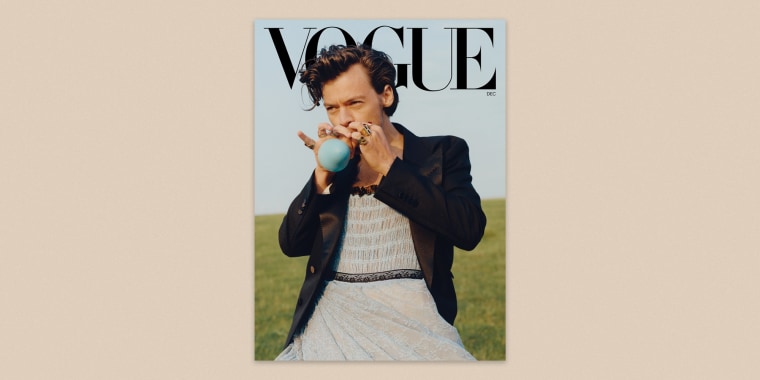If "the clothes make the man," then, for conservative commentator Candace Owens, those clothes better be "manly." Indeed, she argues, human civilization depends on it.
Owens' remarks, broadcast in a series of tweets, were in response to British pop star Harry Styles' donning a Gucci gown replete with lace and ruffles, under a black blazer, for the cover of Vogue's December issue. She called Styles' attire, reflecting what she referred to as "the steady feminization of our men," "an outright attack" on society. She finished her thought with a declaration: "Bring back manly men."
At a time of intersecting crises — a global pandemic that is devastating lives, police violence against Black people and inflamed racism, an autocratic president who threatens American democracy by refusing to concede the election — devoting energy to criticizing a magazine cover feels a bit strange, even misguided. But the fact that the tweet racked up close to 100,000 likes in a few days indicates that Owens — for better or worse — has hit a nerve.
For Owens (as well as for the tens of thousands of people who liked her tweet) the continuation of "society" wholly depends on the impermeability of classes and castes — from gender to race to economic. This is why she very strangely includes a quip about Marxism — that "the steady feminization of our men at the same time that Marxism is being taught to our children is no coincidence."
Conservatives like Owens, on the other hand, fear the destruction of boundaries and of borders that maintain the traditional social — gender and racial — hierarchy.
Marxism, at its simplest, is an ideology that espouses the creation of a classless society; it provides the framework for communism as practice. People like Owens, on the other hand, fear the destruction of boundaries and of borders that maintain the traditional social — gender and racial — hierarchy. This terror of this loss of supremacy is manifest in a variety of policies and tactics, from vilifying Black Lives Matter to punishing migrants and refugees and throwing their children in cages.
Gender, specifically as a category that enables discrimination based on bodily appearance, is arguably the most ancient human boundary. Conservatives, consciously or not, view traditional boundaries as fundamental not only to society's permanence but also to their very own understanding of their individual selves. It's no surprise they express panic when gender becomes a disco.
The gender binary as a worldview states that a man is defined by his masculinity, which is based upon traits and appearance and actions of dominance. Conversely, a woman is defined by her femininity, in accordance with submissiveness. It is not that men innately are more powerful. No. Rather, it is that dominance is understood as powerful. That men have exacted forms of dominance over time — through expressions of violence, aggression and virility; from war to genocide, rape to lynching — has instilled the belief that man is biologically powerful and that masculinity is expression of this power. Femininity, situated as the essential, binary opposite of masculinity, must be continually policed so masculinity remains impenetrable and unquestioned.
And yet what has been all too revealing, especially during this pandemic, is how differently, and much more effectively, power is wielded by women. For women like Germany's Angela Merkel, New Zealand's Jacinda Ardern and Taiwan's Tsai Ing-wen, leadership means harnessing the powers of their offices to protect their people by putting their lives first. It is no wonder that many woman-led countries have better controlled the pandemic — especially when compared to countries lead by autocratic, power-hungry men.
It has been the work of feminists not only to show how this gender binary has functioned in society but also to underscore how arbitrary — how, to use academic-speak, "constructed" — this binary is.
This is why something so seemingly innocuous as a photo of a former boy-bander in a dress causes such gender panic — because it exposes the artificial boundaries of our society. Historically, clothing has been codified, even regulated by law, to represent the two traditional genders. Dresses represent femininity, which allegedly should be expressed only by women. This thinking relied heavily on the moral policing prescribed by religious doctrine; in Christian societies, Deuteronomy 22:5 explicitly states: "A woman shall not wear man's clothing, nor shall a man put on a woman's clothing; for whoever does these things is an abomination to the Lord your God." (This is all a bit odd, since Christian iconography has everyone — male and female — in dress robes. There are no pants in sight!)
For Styles, "clothes are there to have fun with and experiment with and play with," he says in his accompanying Vogue interview. "When you take away 'There's clothes for men and there's clothes for women,' once you remove any barriers, obviously you open up the arena in which you can play. ... [A]nytime you're putting barriers up in your own life, you're just limiting yourself. There's so much joy to be had in playing with clothes. I've never really thought too much about what it means — it just becomes this extended part of creating something."
Where people like Styles find freedom in the in-between, in crossing borders and boundaries, others, like Owens, find destruction — and, it appears, Marxism. These competing worldviews represent two very distinct notions of freedom. But while Styles advocates a type of freedom embodied by creative expression and creative independence, Owens — a conservative who drapes herself in the American flag — espouses a freedom based in constraint and male dominance.


